What France started with its nationwide ban on plastic is now gradually gaining a foothold in other countries. In view of this, TVU Garnvertrieb Ltd from Leutershausen is now offering a solution with its CompoPac cellulose nets, which are intended to cover the increasing demand for sustainable, but compostable packaging.
We spoke with Sales Manager Michael Bandel and his colleague Dominik Gedon about the current development of the nets as well as the latest product from TVU/CompoPac: plastic-free climbing aids for greenhouse cultivation. As with the nets, this is a 100 percent environmentally friendly alternative made from cellulose, that ensures a climate-neutral value chain.
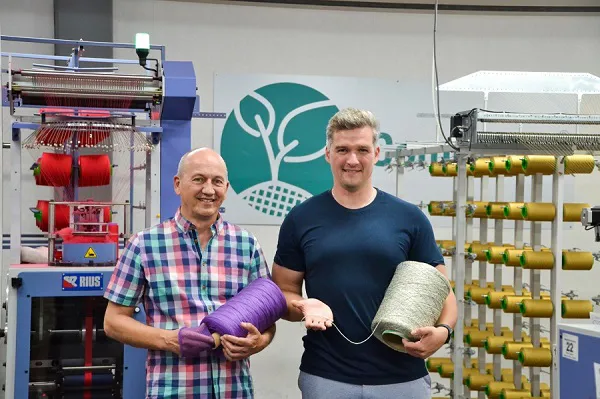 Image: Dominik Gedon and Michael Bandel of CompoPac
Image: Dominik Gedon and Michael Bandel of CompoPac
Increasing demand for cellulose nets across Europe
"When we started production in 2019/2020, the market was still using very differentiated designs. Interest in cellulose nets was relatively low, certainly because the price was still too high for some customers. At that time, however, we already had the goal of winning over the entire European market. Thanks to the work of people like Greta Thunberg, we have seen a much broader social rethinking of many aspects, so now some retailers are packing their organic goods with cellulose," says Bandel.
TVU uses only fibers from Austria as the starting product for the nets. "It is important to us, in terms of quality and sustainability, that the entire production -from fiber to finished net- takes place in Europe. It is 100 percent 'Made in Europe'," Gedon adds.
When the 'AGEC' law kicked in in France, the company was still in its infancy, but at the same time it was able to prove itself in the French market early on. "However, supply was far from being in line with demand. In the past year and a half, we have expanded our production enormously, in several expansion stages, to meet the high market demand. The development of cellulose nets is steadily gaining ground," Bandel says. The developments in Spain are similar to those in France. In general, cellulose will establish itself as a worldwide player, says Bandel. Therefore, after this year's production expansion, the next expansion stage, for 2023, is already being planned.
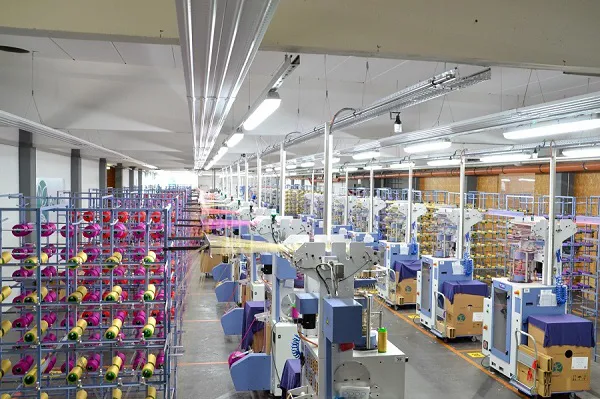
Image: The production hall after the 2022 expansion
Growing market - service orientation in the foreground
The nets are most widely used for products such as onions, garlic, apples and citrus fruits. Since CompoPac is a brand supported by two companies - namely TVU and Weinhold-Textil Ltd - a quick response to the current market situation is possible. The biggest buyers for the nets are large packers as well as growers and cooperatives.
"However, our competitors are not sitting idly by. Of course, producers of plastic nets are still in the market, and some are already looking at the opportunities regarding cellulose. However, the market is still in a growth phase, so it is currently more about service, speed and flexibility. These are the factors that will convince your customers. And it is precisely in these three fields that we are very well positioned. Apart from that, direct customer contact is also one of our absolute strengths."
Fully compostable climbing aids for greenhouse and tunnel cultivation
The latest product from TVU/CompoPac is the cellulose vine climbing aid. For the production of this product, TVU previously met with many growers who were actively involved in the development of the products. "We focused on the idea of producing a cellulose string that is fully compostable, replacing plastics. The strings must be able to hold an entire crop without tearing. Beyond that, however, compostable cords have many other subtleties, which we focused on during the development phase. In terms of performance, they will offer the same characteristics as plastic cords. However, a major advantage is that cellulose cords can be disposed of and composted together with the plant residues. This eliminates the sorting process and it saves the grower additional disposal costs."
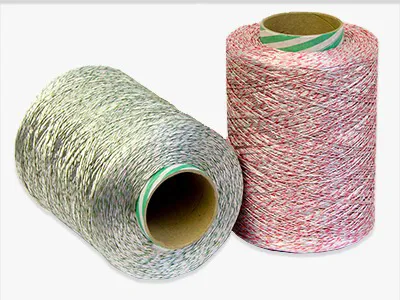
Image: The compostable vine strings, on rolls
The decisive factor in this product is its strength. "It starts with a strength of 300 Newton, which is particularly suitable for light plants. From 400 Newton onward, we speak of climbing aids for heavy plants. We have adapted the twine to the respective products. The climbing twine is very suitable for greenhouse cultivation."
Gedon: "As textile experts, we have everything under one roof. There are the different internal production stages, the in-house strength testing equipment in our test laboratory and the yarn procurement department. We can also rely on short delivery times and consistent quality."
Foundation laid 20 years ago
The Bavarian company, with its production site in Leutershausen, is the single source for nets. It has its own yarn procurement, dyeing plant and knitting machines. "This way, we combine several elements along the value chain under one roof," Michael Bandel explains. Added to this are the extensive logistics options, which create remarkable flexibility, and the quality management division with its own laboratory, which guarantees a high-quality, consistently food-safe product.
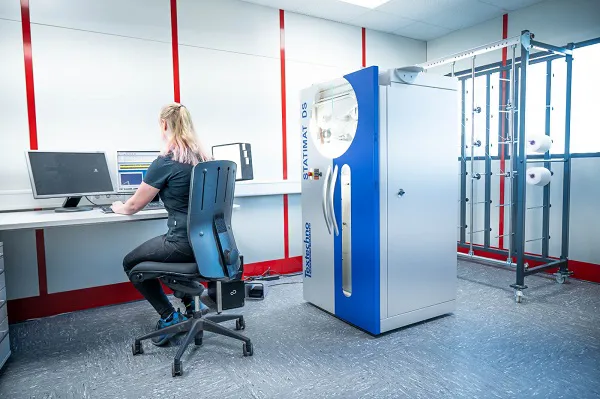
Image: Testing the tensile strength of the yarn with the Statimat DS
Gedon reports that the company recognized procurement and logistics problems at a very early stage, which is why it managed to stock up on sufficient quantities of the necessary raw materials to ensure continued availability.
"More than 20 years ago, our company philosophy was already built around renewable energies and sustainability. Because of this, we now rely on the generation of electricity through the company's own photovoltaic system (approx. 1,000,000 kWh/a) and the generation of heat in our wood chip heating system (approx. 8,000,000 kWh). Because of this foresight, we are now weathering the difficult global situation much more easily."
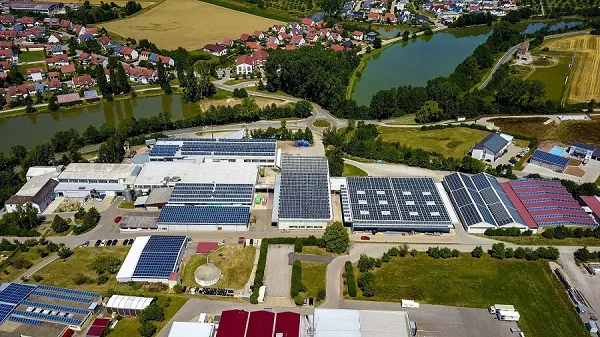
Photo: TVU's production site in Leutershausen (Germany)
Dominik Gedon will attend Fruit Attraction in Madrid this October. He welcomes anyone who wants to meet with him. The can contact him in advance or even during the trade show via info@compopac.de or +49 171 8434 037.
For more information:
Michael Bandel und Dominik Gedon
CompoPac
TVU Textilveredlungsunion GmbH
TVU Garnvertrieb GmbH
Rammersdorfer Str. 8
D-91578 Leutershausen
Tel.: +49 (0) 9823 955 160
info@compopac.de
www.compopac.de
www.tvu.de
